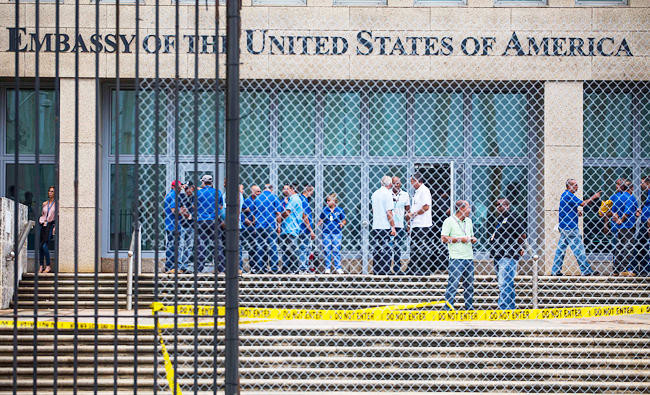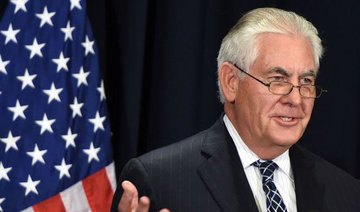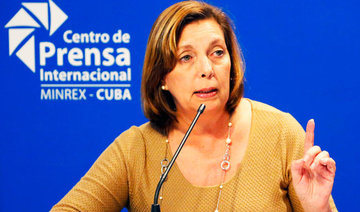WASHINGTON: The United States delivered an ominous warning to Americans on Friday to stay away from Cuba and ordered home more than half the US diplomatic corps, acknowledging neither the Cubans nor America’s FBI can figure out who or what is responsible for months of mysterious health ailments.
No longer tiptoeing around the issue, the Trump administration shifted to calling the episodes “attacks” rather than “incidents.”
The US actions are sure to rattle already delicate ties between the longtime adversaries who only recently began putting their hostility behind them. The US Embassy in Cuba will lose roughly 60 percent of its American staff and will stop processing visas for prospective Cuban travelers to the United States indefinitely, officials said. Roughly 50 Americans had been working at the embassy.
President Donald Trump said that in Cuba “they did some very bad things” that harmed US diplomats, but he didn’t say who he might mean by “they.”
Though officials initially suspected some futuristic “sonic attack,” the picture is muddy. The FBI and other agencies that searched homes and hotels where incidents occurred found no devices.
Secretary of State Rex Tillerson, who reviewed options for a response with Trump, said, “Until the government of Cuba can ensure the safety of our diplomats in Cuba, our embassy will be reduced to emergency personnel in order to minimize the number of diplomats at risk of exposure to harm.”
In Friday’s travel warning, the State Department confirmed earlier reporting by The Associated Press that US personnel first encountered unexplained physical effects in Cuban hotels. While American tourists aren’t known to have been hurt, the agency said they could be exposed if they travel to the island — a pronouncement that could hit a critical component of Cuba’s economy that has expanded in recent years as the US has relaxed restrictions.
At least 21 diplomats and family members have been affected. The department said symptoms include hearing loss, dizziness, headache, fatigue, cognitive issues and difficulty sleeping. Until Friday, the US had generally referred to “incidents.” Tillerson’s statement ended that practice, mentioning “attacks” seven times; the travel alert used the word five times.
Still, the administration has pointedly not blamed Cuba for perpetrating the attacks, and officials have spent weeks weighing how to minimize the risk for Americans in Cuba without unnecessarily harming relations or falling into an adversary’s trap.
If the attacks have been committed by an outside power such as Russia or Venezuela to drive a wedge between the US and Cuba, as some investigators have theorized, a US pullout would end up rewarding the aggressor. On the other hand, officials have struggled with the moral dimensions of keeping diplomats in a place where the US government cannot guarantee their safety.
The administration considered expelling Cuban diplomats from the US, officials said, but for now no such action has been ordered. That incensed several lawmakers who had urged the administration to kick out all of Cuban’s envoys.
“It’s an insult,” said Florida Sen. Marco Rubio, a vocal critic of Cuba’s government, in an interview. “The Cuban regime succeeded in forcing Americans to downscale a number of personnel in Cuba, yet it appears they’re going to basically keep all the people they want in America to travel freely and spread misinformation.”
The US travel warning said, “Because our personnel’s safety is at risk, and we are unable to identify the source of the attacks, we believe US citizens may also be at risk and warn them not to travel to Cuba.”
Canada, which also has reported diplomats with unexplained health problems, said it had no plans to change its diplomatic posture in Cuba.
The US moves deliver a significant setback to the delicate reconciliation between America and Cuba, countries that endured a half-century estrangement despite only 90 miles of separation. In 2015, President Barack Obama and Cuban President Raul Castro restored diplomatic ties, embassies were re-opened and travel and commerce restrictions were eased. Trump has reversed some changes but has broadly left the rapprochement in place.
After considering options that ranged all the way to a full embassy shutdown, Tillerson made the decision to reduce all nonessential personnel and all family members. Also included in the recall is Scott Hamilton, currently the highest-ranked diplomat at the mission. Staffing at the embassy in Havana was already lower than usual due to recent hurricanes that whipped through Cuba.
Cubans seeking visas to enter the US may be able to apply through embassies in nearby countries, officials said. The US will stop sending official delegations to Cuba, though diplomatic discussions will continue in Washington.
The United States notified Cuba early Friday via its embassy in Washington.
Cuba blasted the American move as “hasty” and lamented that it was being taken without conclusive investigation results. Still, Josefina Vidal, Cuba’s top diplomat for US affairs, said her government was willing to continue cooperation with Washington “to fully clarify these incidents.” Her government took the rare step of the inviting the FBI to the island after being presented with the allegations earlier this year.
To medical investigators’ dismay, symptoms have varied widely. In addition to hearing loss and concussions, some people have experienced nausea, headaches and ear-ringing. The Associated Press has reported some now suffer from problems with concentration and common word recall.
Some US diplomats reported hearing loud noises or feeling vibrations when the incidents occurred, but others heard and felt nothing yet reported symptoms later. In some cases, the effects were narrowly confined, with victims able to walk “in” and “out” of blaring noises audible in only certain rooms or parts of rooms, the AP has reported
Though the incidents stopped for a time, they recurred as recently as late August.


US to Americans: Stay away from Cuba after health ‘attacks’
US to Americans: Stay away from Cuba after health ‘attacks’

UN chief ‘condemns in the strongest terms’ attack on mosque in Pakistan, spokesperson says

WASHINGTON: The United Nations Secretary-General Antonio Guterres “condemns in the strongest terms” Friday’s attack on a mosque in Islamabad, Pakistan, a UN spokesperson said in a statement.
© 2026 SAUDI RESEARCH & PUBLISHING COMPANY, All Rights Reserved And subject to Terms of Use Agreement.













